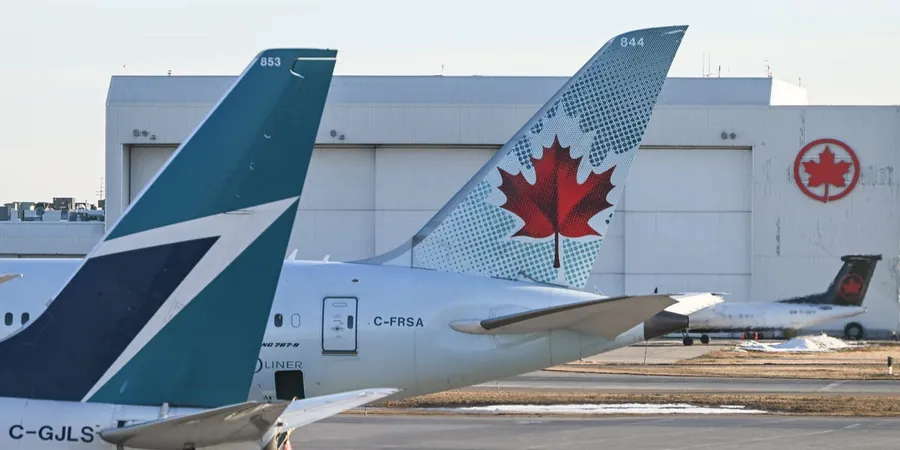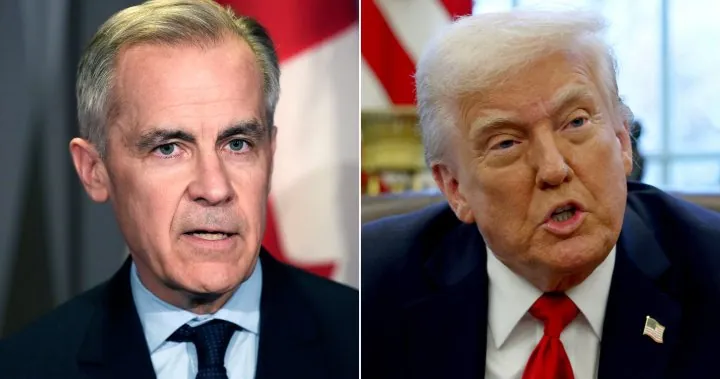
Canadians Heed Boycott Call: Travel to US Plummets Amid Tariff Tensions
2025-03-14
Author: Michael
Recent data from Statistics Canada has revealed a striking 23% drop in the number of Canadians driving to the United States last month, highlighting the impact of ongoing tariff disputes between the two neighboring countries.
In a bid to support Canadian tourism, outgoing Prime Minister Justin Trudeau called on citizens to opt for domestic vacations instead of traveling south of the border. His comments came shortly after U.S. President Donald Trump imposed hefty tariffs—up to 25%—on imports from Canada and Mexico, a move that has sparked considerable backlash from Canadian travelers.
The decline in travel was further underscored by Flight Centre Travel Group, a leading Canadian travel agency, which reported a staggering 40% decrease in leisure bookings to the U.S. comparing February of this year with the same month in 2022. Amra Durakovic, a company spokesperson, noted a significant trend: Canadians are showing a growing preference for international destinations outside the U.S. as they reevaluate their travel plans.
A recent Leger survey also indicated that Trudeau's call for a boycott resonates with Canadians: nearly half of the respondents expressed they were less likely to visit the U.S. this year, while 60% planned vacations within Canada's borders instead. Rachel J.C. Fu, director of the Eric Friedheim Tourism Institute at the University of Florida, explained that the negative sentiment surrounding the tariffs is directly influencing Canadian travel behavior.
The economic implications of this decline extend beyond tourism. The U.S. Travel Association has estimated that a reduction of 10% in Canadian travelers could spell a staggering $2.1 billion in lost revenue for the U.S. economy and lead to approximately 14,000 job losses—especially in top destinations like Florida, California, and New York.
Businesses that traditionally rely on Canadian tourism are already feeling the pinch. Tony Poletti, owner of Marketside Restaurant in Niagara Falls, New York, expressed concern about the situation, noting that many of his loyal Canadian patrons have voiced hesitations about traveling due to the tariffs imposed by the U.S. government. He aptly stated, “It’s just a matter of time before we feel the impact of it,” indicating that the economic ramifications could soon ripple into American businesses.
Economic uncertainty and market fluctuations have also intensified due to remarks from Trump about a potential recession, leading to heightened jitters in the stock market. Following statements regarding additional tariffs on steel and aluminum from Canada, stocks took a dive, which raised concerns about long-term economic stability.
Experts warn that unless diplomatic solutions are found to bridge the trade rift, Canadian travel to the U.S. may continue to dwindle, potentially lasting for months or even years. “The U.S. tourism industry may need to prepare for a prolonged downturn in Canadian visitors,” Fu noted.
As Canadians reassess their travel choices in light of these trade tensions, the broader implications of a boycotting spirit are becoming evident—not just for tourism, but for the U.S. economy as a whole. What does this mean for the future of U.S.-Canadian relations and the livelihoods of many alongside the border? Only time will tell, but the stakes continue to rise.









 Brasil (PT)
Brasil (PT)
 Canada (EN)
Canada (EN)
 Chile (ES)
Chile (ES)
 Česko (CS)
Česko (CS)
 대한민국 (KO)
대한민국 (KO)
 España (ES)
España (ES)
 France (FR)
France (FR)
 Hong Kong (EN)
Hong Kong (EN)
 Italia (IT)
Italia (IT)
 日本 (JA)
日本 (JA)
 Magyarország (HU)
Magyarország (HU)
 Norge (NO)
Norge (NO)
 Polska (PL)
Polska (PL)
 Schweiz (DE)
Schweiz (DE)
 Singapore (EN)
Singapore (EN)
 Sverige (SV)
Sverige (SV)
 Suomi (FI)
Suomi (FI)
 Türkiye (TR)
Türkiye (TR)
 الإمارات العربية المتحدة (AR)
الإمارات العربية المتحدة (AR)